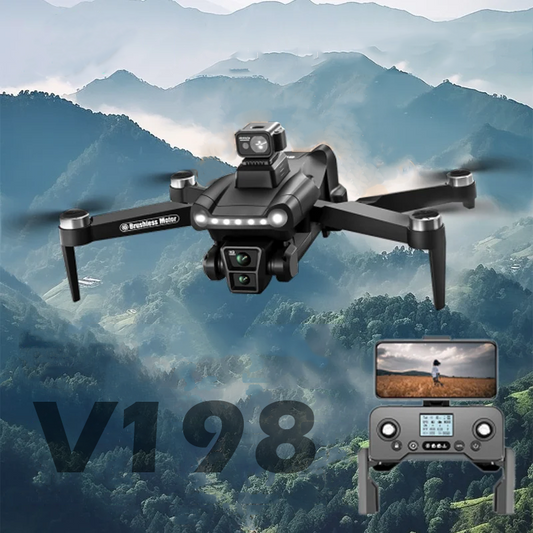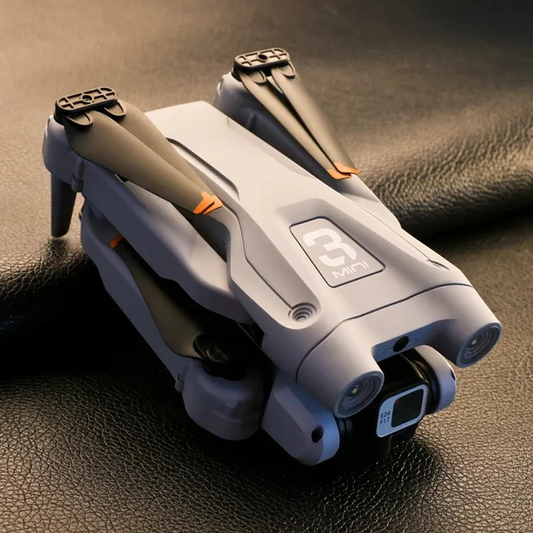Drones in Science: Advancements in Research

In the ever-evolving landscape of scientific research, the integration of cutting-edge technologies has become paramount. One such revolutionary tool making waves in the scientific community is the drone. Drones, or Unmanned Aerial Vehicles (UAVs), have transcended their recreational origins to become indispensable instruments in scientific exploration. In this article, we delve into the fascinating realm of "Drones in Science," exploring the myriad ways in which these aerial marvels are propelling advancements in research.
Surveying the Landscape of Scientific Advancements:

The scientific community has embraced drones as versatile platforms for data collection and analysis. Aerial surveys, once limited by the constraints of human accessibility, have now transcended boundaries. Drones equipped with state-of-the-art sensors are providing researchers with unparalleled perspectives, enabling them to monitor and analyse landscapes with unprecedented accuracy.
1.Precision Agriculture:
Drones equipped with multispectral cameras are transforming the agricultural landscape. These high-tech devices can capture detailed images of crops, allowing farmers and researchers to assess plant health, detect diseases, and optimise irrigation. The result is not only increased efficiency but also a more sustainable approach to farming.
2.Environmental Monitoring:
The ability to monitor vast and remote areas has made drones indispensable in environmental research. From tracking wildlife populations to assessing the impact of climate change on ecosystems, drones are providing researchers with a bird's-eye view of our planet, facilitating data-driven decision-making for a sustainable future.
Drones and Scientific Exploration:

1.Oceanic Research:
The exploration of the world's oceans has been greatly enhanced by the use of underwater drones. These remotely operated vehicles (ROVs) equipped with advanced imaging and sampling tools can delve into the depths, uncovering marine mysteries that were once beyond human reach. From studying underwater ecosystems to exploring deep-sea trenches, drones are expanding our understanding of the oceans.
2.Archeological Excavations:
Unearthing the secrets of the past has taken a technological leap with the integration of drones in archeological research. Aerial surveys using drones help archaeologists map and document historical sites with unprecedented precision. This not only expedites the excavation process but also minimises potential damage to delicate artefacts.
Drones in Health Sciences:

1.Medical Supply Delivery:
Drones are proving to be lifesavers in the field of healthcare. In remote or disaster-stricken areas, where access to medical supplies may be challenging, drones can be deployed for swift and efficient delivery. This has the potential to revolutionise emergency medical responses and bridge gaps in healthcare accessibility.
2.Disease Monitoring and Surveillance:
The ongoing battle against infectious diseases has found a powerful ally in drones. These devices can be equipped with sensors to monitor environmental conditions, track the movement of disease vectors, and provide valuable data for disease prevention and control strategies.
Drones in Scientific Research: Overcoming Challenges:

While drones offer incredible advantages in scientific research, their integration is not without challenges. Privacy concerns, regulatory hurdles, and technical limitations are aspects that researchers and policymakers must navigate. Striking a balance between harnessing the potential of drone technology and addressing these challenges is crucial for the responsible and ethical use of drones in science.
1.Regulatory Frameworks:
Governments around the world are working to establish clear regulatory frameworks for the use of drones. This includes guidelines for drone registration, flight restrictions, and privacy protection. Researchers must adhere to these regulations to ensure the safe and legal use of drones in their scientific endeavours.
2.Privacy Considerations:
The use of drones for data collection raises concerns about privacy, especially when conducting surveys in populated areas. Researchers must implement measures to safeguard the privacy of individuals and comply with data protection laws. This involves obtaining informed consent, anonymizing data, and employing encryption technologies where applicable.
3.Technological Innovation:
As drone technology continues to evolve, researchers must stay abreast of the latest developments. From improved battery life to more advanced sensors, staying at the forefront of technological innovation ensures that scientists can leverage the full potential of drones in their research.
The Future of Drones in Scientific Research:

The trajectory of drones in scientific research points towards an exciting future. As technology advances and researchers continue to push the boundaries of what is possible, we can expect even greater integration of drones across diverse scientific disciplines.
1.Artificial Intelligence Integration:
The synergy between drones and artificial intelligence is set to redefine scientific research. AI algorithms can process vast amounts of data collected by drones, extracting meaningful insights and accelerating the research process. This integration holds tremendous potential for fields such as ecology, climate science, and geology.
2.Interdisciplinary Collaboration:
The use of drones encourages interdisciplinary collaboration among scientists. Researchers from fields as varied as ecology, geology, and anthropology can join forces, pooling their expertise to tackle complex challenges. This collaborative approach fosters innovation and leads to holistic insights that would be difficult to achieve through a single-discipline lens.
Education and Skill Development:
As drones become integral to scientific research, there is a growing need for education and skill development in their operation and application. Training programs for researchers, environmentalists, and other professionals will play a pivotal role in ensuring the responsible and effective use of drones in scientific endeavours.
The marriage of drones and scientific research has given rise to a new era of exploration and discovery. From the depths of the oceans to the far reaches of the atmosphere, drones are expanding the boundaries of what we can observe and understand. As the technology continues to mature, the potential for groundbreaking discoveries across various scientific disciplines is limitless. Researchers and policymakers alike must navigate the challenges responsibly to ensure that the soaring promise of drones in science is realized for the betterment of humanity and our understanding of the world around us.
Explore a variety of drones at our online drone store.
Happy Flying!









